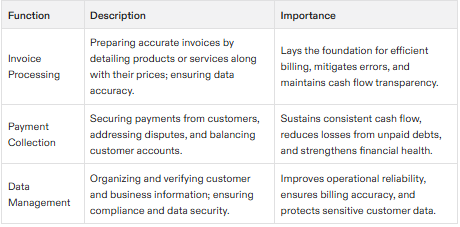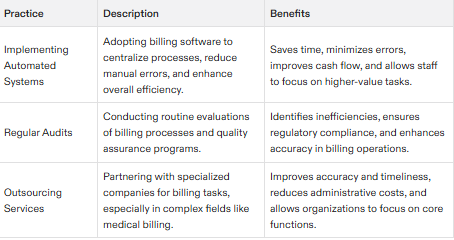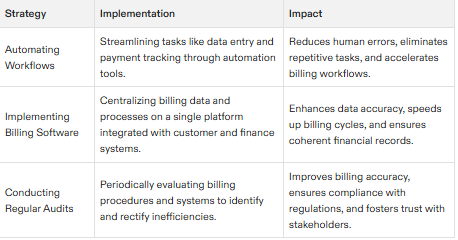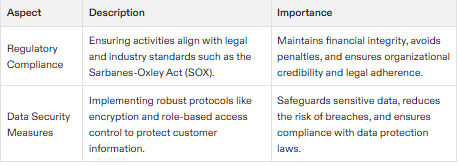Billing Departments
Efficient Practices for Billing Departments
Billing departments play a crucial role in maintaining financial stability and operational efficiency in any organization. They are responsible for various billing functions such as accurate and timely billing, payment collection, and data management. This article explores the key functions, best practices, and strategies to enhance the efficiency of billing departments.
Key Takeaways
Billing departments are essential for accurate invoicing, ensuring customers are billed correctly, payment collection, and customer account management, impacting an organization’s financial stability.
Implementing automated systems and regular audits can enhance operational efficiency, reduce costs, and improve cash flow and customer satisfaction.
Compliance with industry regulations and robust data security measures are critical for maintaining financial stability and protecting sensitive customer information.
Understanding Billing Operations
Billing operations are the backbone of any organization’s financial management, encompassing the management of billing systems, processes, and procedures. A thorough understanding of these operations is crucial to ensure that customers receive accurate and timely bills, and that the organization can effectively manage its revenue.
At the heart of billing operations lies the billing system, which must be robust and reliable to handle the complexities of invoicing and payment collection. This system should integrate seamlessly with other financial and customer management systems to ensure data accuracy and streamline processes. Effective billing operations involve meticulous attention to detail, from the initial generation of bills to the final reconciliation of payments.
Managing billing operations also requires a strategic approach to process optimization. Regular reviews and updates to billing procedures can help identify inefficiencies and areas for improvement. By continuously refining these processes, organizations can enhance their billing accuracy, reduce errors, and improve overall operational efficiency.
In summary, understanding and managing billing operations is essential for maintaining financial stability and ensuring customer satisfaction. By leveraging advanced billing systems and optimizing processes, organizations can achieve prompt and accurate billing, ultimately supporting their financial health and growth.
The Role of Billing Departments
The billing department serves as the critical support structure for any entity, tasked with guaranteeing that products and services are invoiced correctly and without undue delay. Their role encompasses the handling of payment processing, management of customer accounts, and overseeing that payments are solicited in a timely fashion. Achieving prompt and accurate billing stands at the core of their mission to uphold fiscal health and streamline organizational operations.
Personnel within these departments rigorously maintain precision and adherence to regulatory standards concerning monetary transactions. They adeptly handle client interactions by addressing all inquiries related to billing swiftly, thus ensuring efficient resolution of any issues encountered.
The impact of streamlined billing procedures is pivotal in safeguarding an enterprise’s financial well-being—underscoring just how fundamental an effective billing department is to business success.
Key Functions of a Billing Department
The process of billing involves crucial functions for efficient operation, such as handling invoices, collecting payments, and managing financial data, all of which depend on accurately identifying the services provided. These components are essential to guarantee prompt and accurate billing while preserving the fiscal health of an organization.
Invoice Processing
The billing department is integral to the billing process, starting with delineating provided products or services along with their prices to prepare precise invoices. This initial phase lays down a crucial groundwork for all following activities within the billing system. Ensuring that this system aligns with the company’s pricing structure and conducting routine account reviews are vital steps in guaranteeing that each invoice correctly represents outstanding amounts.
It falls upon the members of the billing team to draft invoices while meticulously verifying that calculated sums owed are exact, thereby mitigating potential delays or disagreements stemming from inaccuracies. Keeping a vigilant record of payment receipts against issued invoices is essential for preserving transparency in transactions and securing an uninterrupted influx of cash flow.
Adeptness and precision underscore successful invoice processing within any given department focused on billing matters. When payments correlate precisely with accurate invoicing, it markedly bolsters an entity’s economic viability.
Payment Collection
The billing department plays a crucial role in managing the collection of payments, which involves securing payment from customers, processing these transactions effectively, balancing customer accounts, and addressing any concerns related to disputes or reimbursements. Such activities are vital for sustaining consistent cash flow and contributing to the financial health of the organization.
It is incumbent upon the billing staff to diligently pursue overdue payments and verify that all accounts held by customers are up-to-date. To achieve this objective, robust collection procedures must be implemented alongside frequent communication with clients aimed at settling payment discrepancies. Executing such measures reduces potential losses from unpaid debts while simultaneously bolstering streams of revenue.
Data Management
The management of data is essential for the effective operation of billing departments, as they need to organize and confirm both customer and business details before issuing invoices. To achieve this, integration between CRM (Customer Relationship Management) systems and ERP (Enterprise Resource Planning) systems is necessary so that all information remains correct and current. The integrity of data management practices guarantees adherence to industry standards while securing client data.
It’s the responsibility of those in the billing department to maintain stringent security measures over sensitive materials. Compliance with regulations specific to their industry is critical not only for safeguarding customer information, but also for maintaining moral business conduct. When managed efficiently, such meticulous handling of data bolsters the precision and dependability inherent within billing procedures, which thereby enhances overall organizational productivity.
Enhancing Efficiency in Billing Operations
Optimizing the efficiency of billing processes is essential for cutting expenses and boosting productivity. Optimizing billing processes enables organizations to better provide services to their customers, ensuring timely and accurate billing. Utilization of automated systems, coupled with frequent audits of procedures, greatly improves the effectiveness of billing departments.
Consequently, this improvement results in heightened satisfaction among customers and promotes financial robustness.
Implementing Billing Software
By centralizing information within a single platform, specialized billing software optimizes workflows and diminishes the likelihood of mistakes caused by manual data entry. This integration enhances the precision of financial documentation significantly. The provision of real-time data analytics through such systems aids in promptly pinpointing trends in performance as well as recognizing sectors that require enhancement, which supports swift strategic alterations.
Businesses can realize monthly savings reaching up to $22,000 by employing automated billing solutions that can slash billing time by as much as 90%. These technological innovations liberate valuable resources for redistribution to essential business operations, thereby curtailing the aggregate expenditure on operational processes.
Automating Workflows
The billing department benefits from automation by streamlining data entry processes, creating workflows for payment plans, and maintaining the accuracy of customer information. By automating these tasks, manual work is decreased and repetitive activities are eliminated, leading to a more efficient functioning of billing departments.
Automated tools aid in preserving past invoices and keeping track of payments without human intervention. This helps reduce errors caused by humans and promotes punctual and precise payments that contribute to the overall improvement of billing procedures.
Regular Audits and Quality Assurance
Routine evaluations and quality assurance programs are instrumental in pinpointing inefficiencies while safeguarding adherence to data protection standards. Regular inspections enable billing departments to identify weaknesses, thereby advancing the management of claims procedures.
Implementing a strong quality assurance strategy can significantly bolster the precision and dependability of billing activities. Such measures result in improved cash flow, compliance with regulations, promptness, and exactness which collectively contribute to superior financial oversight.
Outsourcing Medical Billing Services
Outsourcing medical billing services has become an increasingly popular strategy for healthcare providers looking to streamline their billing operations and focus more on patient care. By partnering with a specialized billing company, healthcare providers can benefit from improved accuracy and timeliness in their billing processes, reduced administrative costs, and enhanced cash flow.
One of the primary advantages of outsourcing medical billing services is the ability to leverage the expertise of a dedicated billing company. These companies have a deep understanding of the complexities of medical billing, including coding, insurance claims, and regulatory compliance. This expertise ensures that bills are processed accurately and efficiently, reducing the likelihood of errors and delays.
Additionally, outsourcing medical billing services can lead to significant cost savings. By reducing the need for in-house billing staff and minimizing administrative overhead, healthcare providers can allocate more resources to patient care and other critical areas. This not only improves operational efficiency but also enhances patient satisfaction by allowing healthcare providers to focus on delivering high-quality care.
Choosing the right billing company is crucial to realizing these benefits. It is essential to select a reputable and experienced provider with a proven track record of delivering accurate and efficient billing services. The billing company should offer customized solutions tailored to the specific needs of the healthcare provider, ensuring seamless integration with existing systems and processes.
In conclusion, outsourcing medical billing services offers numerous benefits, including improved billing accuracy, reduced costs, increased cash flow, and enhanced patient satisfaction. By partnering with a reliable billing company, healthcare providers can optimize their billing operations and focus on what they do best—providing exceptional care to their patients.
Compliance and Security in Billing Departments
In the realm of billing departments, adherence to regulatory standards and maintaining security are crucial factors. Processes for accurate billing along with compliance with regulations safeguard against financial discrepancies and mitigate the risk of incurring fines.
We will now explore essential elements concerning regulatory adherence and protection of data within this segment.
Regulatory Compliance
Billing departments are responsible for ensuring compliance with industry regulations on handling customer billing and payment data. Compliance with the Sarbanes-Oxley Act (SOX) is crucial for maintaining financial transparency, especially during subscription management.
Staying updated on industry changes and compliance requirements maintains lawful practices. Quality assurance programs enhance compliance and improve billing operations’ timeliness and accuracy.
Data Security Measures
In billing departments, stringent data security protocols safeguard confidential customer details. By implementing role-based access restrictions in billing software, the risk of unauthorized parties obtaining sensitive customer information is significantly reduced. Automated billing systems bolster security through vigilant monitoring for any unusual activity and employing encryption techniques to thwart potential data breaches.
It’s crucial that billing entities take into account legal mandates such as the California Consumer Privacy Act (CCPA) when managing personal data to ensure compliance and uphold privacy standards.
Managing Relationships with Insurance Companies
Navigating the intricacies of billing policies and insurance claims is a crucial element in the healthcare sector’s billing process to secure compensation for providers. Effective collaboration with insurance agents or brokers can expedite dispute resolution, thanks to their strong connections within the insurance industry.
When disputes continue without resolution, drafting a detailed letter to the concerned insurance company can clearly state the problem along with a suggested solution. Should such disputes persist, reaching out to your local state’s department responsible for overseeing insurance matters may offer assistance and direction.
Handling Customer Service Inquiries
Handling customer service inquiries is a vital function of any billing department, as it directly impacts customer satisfaction and the overall efficiency of billing operations. Customer inquiries can range from simple questions about billing statements to complex issues involving insurance coverage and payment procedures. To manage these inquiries effectively, billing departments must have a clear and efficient process in place.
A well-structured process for handling customer service inquiries begins with providing clear and concise billing statements. These statements should include all necessary information, such as itemized charges, payment due dates, and contact information for customer support. By ensuring that customers have a comprehensive understanding of their bills, billing departments can reduce the volume of inquiries and improve overall satisfaction.
A dedicated customer service team is essential for responding to inquiries promptly and efficiently. This team should be well-trained in billing systems and procedures, as well as equipped with excellent communication and interpersonal skills. They should be able to listen actively to customer concerns, respond empathetically, and resolve issues in a fair and efficient manner.
In addition to having a dedicated team, it is important to establish a clear and consistent process for resolving customer complaints and issues. This process should include steps for investigating and addressing concerns, as well as a system for tracking and monitoring inquiries to ensure timely resolution. By maintaining a systematic approach, billing departments can improve their responsiveness and reduce the likelihood of recurring issues.
Key skills required for handling customer service inquiries include strong communication abilities, knowledge of billing systems, and the capacity to resolve complex issues. Staff should be able to work effectively in a fast-paced and dynamic environment, balancing the need for efficiency with the importance of providing high-quality customer service.
In summary, an effective process for handling customer service inquiries is crucial for maintaining customer satisfaction and enhancing the efficiency of billing operations. By providing clear billing statements, having a dedicated customer service team, and implementing a systematic approach to resolving inquiries, billing departments can ensure prompt and accurate responses to customer concerns, ultimately supporting the organization’s financial health and operational success.
Training and Support for Billing Department Staff
The significance of continuous training and support cannot be overstated in ensuring efficient billing procedures. Billing specialists must possess a mix of expertise that encompasses proficiency with billing software as well as robust communication abilities.
We will delve into why it’s essential to implement structured training initiatives and provide consistent support for the personnel within the billing department.
Employee Training Programs
It’s imperative to implement thorough training initiatives that furnish billing personnel with the requisite expertise and knowledge crucial for proficient management of bills. These educational endeavors must encompass technical aptitudes as well as competencies in customer service, ensuring staff can deftly handle inquiries related to billing.
Inculcating employees with an understanding of billing practices demands meticulously crafted standard operating procedures (SOPs). Incorporating channels for feedback within these training programs plays a pivotal role in facilitating ongoing enhancements and refinements to the instructional content.
Ongoing Support and Development
Continual assistance is essential for sustaining optimal functioning and contentment in work among the employees of the billing department. The enhancement of skills for staff involved in billing can be achieved through professional growth prospects such as training sessions, workshops, and obtaining certifications.
In order to foster career advancement within the department responsible for billing, implementing a mentorship program is beneficial as it encourages the sharing of knowledge. Conducting routine evaluations and providing feedback helps pinpoint opportunities for refinement and pinpoints areas where development is needed amongst personnel.
Consulting Services for Billing Departments
Providers of medical billing services offer support to improve the efficiency of front office operations, including staff training and advice on staffing as well as workflow enhancements. They also assist with medical practice management and software utilization. These consulting services work towards streamlining procedures while ensuring adherence to industry norms and payer contract stipulations, encompassing the range of services delivered by diverse vendors within the sector.
Benefits of Efficient Billing Departments
A billing system that operates effectively can significantly enhance a business by accelerating the collection of payments, which in turn improves cash flow. It reduces human mistakes that frequently result in lost revenue and ensures the scalability of billing practices to match business expansion.
Automated billing systems elevate customer satisfaction levels through their ability to generate comprehensive invoices and monitor payments with efficiency.
Summary
In summary, maintaining an effective billing department is vital for preserving a company’s financial health and operational efficiency. By adopting appropriate measures like integrating automated billing systems, conducting consistent audits, and providing thorough training programs, firms can greatly improve their billing operations.
Such enhancements in the efficiency of a business’s billing department offer more than just monetary advantages. They establish a scalable and dependable system that keeps pace with the expanding requirements of the enterprise, guaranteeing enduring prosperity and contentment among customers.
Frequently Asked Questions
What are the primary functions of a billing department?
The billing department primarily focuses on efficient and accurate invoicing, payment collection, and managing customer accounts. These functions ensure smooth financial operations and maintain positive customer relationships.
How can billing departments enhance their efficiency?
By adopting automated billing systems, performing consistent audits, and ensuring ongoing training and support for their personnel, departments responsible for billing can significantly improve their efficiency.
This integrated approach not only promotes precision in billing practices, but also makes the processes more efficient.
What role does data management play in billing departments?
Data management is essential in billing departments as it ensures accuracy and compliance in billing practices while safeguarding customer information and improving operational efficiency.
Why is regulatory compliance important for billing departments?
Compliance with regulations is essential for the billing departments to maintain financial integrity, avoid incurring fines, and ensure that all procedures are within legal boundaries.
By doing so, it not only secures the organization’s good standing, but also reinforces its fiscal solidity.
How can consulting services benefit billing departments?
Consulting services can significantly improve billing departments by optimizing processes, ensuring compliance with payer contracts, and enhancing overall productivity.
This leads to more efficient operations and better financial outcomes.





